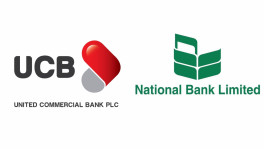When traders get a free ride and consumers have no say

First it was the Covid-induced lockdown, then came the supply chain disruptions followed by sea freight cost hike. Then came the Russia-Ukraine war, global energy price volatility, export ban by India, then dollar market volatility in quick succession. The list of causes gets longer, giving enough reasons for consumer items price hikes. These were mostly global phenomena and thus unavoidable. Then came the domestic price hikes of fuel oils - twice in nine months since November 2021. The latest record hikes now appear as the strongest excuse for retail prices moving to their record highs.
Retailers are the last point of the supply chain who set the price tags that impact consumers directly. Is there a limit to their profit margin? What percentage? Who sets it? Retail business leader Helal Uddin defended retailers. He says a vendor works hard and he needs at least Tk500 a day to feed his five-member family. He has to earn the amount, Helal, president of Bangladesh Dokan Malik Samity, says, finding no fault in the wide difference of prices between the Karwan Bazar wholesale market and Rampura kitchen market in the capital.
While being sympathetic towards retailers or vendors, the business leader bothers the least for consumers. How much do the consumers-- not all have open-ended income- should pay to help the vendor feed his family? Tk3 extra on an egg? Tk30 extra on a kg of patal?
Fuel oil price hikes have come as the latest excuse to squeeze consumers further. Will fuel price hike apply to a pedalled rickshaw van carrying vegetable or egg from Karwan Bazar or Tejgaon wholesale market to the kitchen market or grocery shop in your lane?
In fact, an emergency number, like 999 or the one dedicated helpline for Covid, should be opened by the Directorate of Consumers' Right Protection too. Random raids by magistrates of different agencies alone will not help. Retailers go back to previous practice just after the raids and make up for the penalty by charging consumers even higher. Regulators should receive calls from cheated consumers and send emergency response teams to markets, if possible, deploy inspectors in plain clothes to check retail prices. These efforts may help put market manipulators on the straight path.
Prices soared a few years back too when there was no covid or war. The apex trade body FBCCI set up booths in different key markets in the city and sent teams to check prices along with the commerce ministry. It worked. Similar initiatives were seen during the coordinated drive against formalin, joined by Dhaka Metropolitan Police.
These initiatives are absent now.
The trade bodies are coming up with new excuses and bargain with the government to get duties cut or prices hiked as we have seen in case of edible oils.
Consumers are voiceless scapegoats and nobody owes them an explanation as to why prices go up, nor by how much or for how long.
The global fast-food chain McDonald's, before increasing the price of its cheeseburger in London by 20% in July, told its customers why it had to opt for it, explaining the price would go up for the first time in 14 years due to soaring inflation.
The cheeseburger's price would go up to 1.19 pounds from 99 pence.
"Just like you, our company, our franchisees who own and operate our restaurants, and our suppliers are all feeling the impact of rising inflation," McDonald's made a public announcement.
This is how McDonald's values its customers. A simple notice did not cost them, but it is one of the things that helped the Chicago-based American food chain build its image and 36,000 outlets in over a hundred countries.
The British Retail Consortium also explained why shops and supermarkets had to increase prices by 4.4% in one year till July, the highest since 2005.
None of our consumer-focused companies, nor our trade associations bother to explain their decisions to hike prices to customers.
Did we ever see any such explanation from any of the bakeries why a piece of bun costs Tk5 at a wayside tea-shop that serves low-income customers, or why a small birthday cake in a brand shop costs Tk200 more than last year.
A good number of consumer goods corporate groups are marketing a wide range of items but none bother to explain when prices jump and why. Our consumer goods makers and traders operate far from standard business practices and responsibility towards customers. That is why an egg costs us Tk3 more though fuel price hike adds only Tk3 for 100 eggs to ship by cargo van to Dhaka from Gazipur, a kg of vegetable costs us Tk20-30 more though transport cost rose only Tk0.50 per kg if recent hike in fuel prices are taken into account.
Even then, market regulators seem to wait until good sense prevails on commodity traders. Consumers' Rights Director General A.H.M. Shafiquzzaman calls upon trade community leaders to discuss the ways to discipline the market. "We respond to calls to our hotline 16121 and try our best to address the complaints of consumers flooding our offices. But we alone cannot remove all problems. There are other agencies," he pleaded.
Since fuel price hikes always distort market prices much more than what should be, such hikes should come with clear-cut chart setting bus, truck or launch fares per km with immediate effect. Every time fuel prices are raised, it takes days for BRTA to meet transport owners to fix new fares, which are not implemented as agreed. There is nobody to fix truck fare for goods, while BIWTA sets waterway fares.
Dollar price volatility is also a common excuse being cited now. Rice import this year was lowest in years. Then why did rice prices shoot up during peak season despite a bumper crop and even before the fuel price hike? What do fish, meat, egg, or bottle gourd have to do with the dollar price hike? Are not these all cruel jokes with consumers of all income groups, when inflation is around 7.5% and even the finance minister forecast the latest fuel price hikes will push it further.
Consumers are the main drivers of the private sector led economic growth. Unabated inflation, coupled with the whimsical price hike of consumer goods by a section of unscrupulous traders and failure of market regulators to keep price hike within justifiable limit, will limit consumers' spending capacity. Rising prices will force consumers to tighten their purse strings, and if they buy less, businesses will fall flat. Business growth will be stymied. Middle class people form the consumer society are the engine whose demand propels the private sector growth. Don't the trade bodies and consumer-focused companies owe their consumers an explanation why retail prices have gone up disproportionately with the fuel price hikes?
Of late,prices of both egg and farm-grown chicken marked a significant fall in retail market in the last couple of days following a three-day drive of consumer rights protection agency and fining of a number of egg traders. However, egg prices started falling soon after the commerce minister on 17 August announced that eggs would be imported if prices did not fall.
It means that unusual price movements can be checked if the government's instruments step in.
However, big poultry farms have pocketed an additional amount of Tk520 crore in just 15 days of poultry prices volatility, Bangladesh Poultry Association reported on Saturday, blaming a dozen large companies for price manipulation. During kitchen market inspections, consumer rights protection agency also revealed such evil practices of large market players. Stabilising the rice market is their next mission as prices of the staple see a rise between 12% to 21% compared to a year-ago period, announced its chief AHM Shafiquzzaman.
Can consumers rest assured that something good will happen in the rice market too?


 Keep updated, follow The Business Standard's Google news channel
Keep updated, follow The Business Standard's Google news channel
















